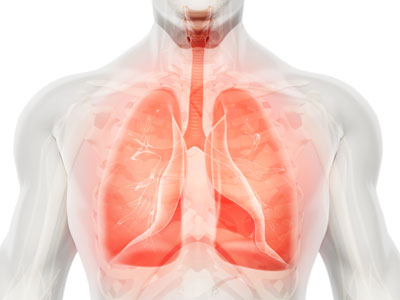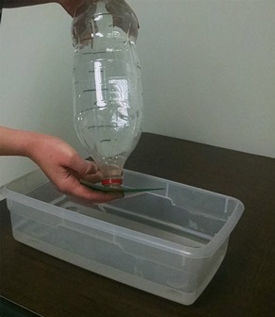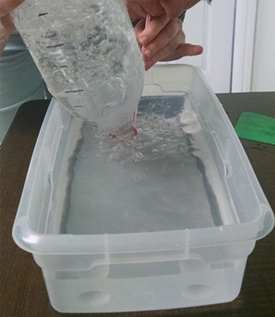How much air do I breathe in?
How does this align with my curriculum?
Learn how to measure lung capacity and about the factors that can affect our lung capacity in this hands on activity.
What You Need
- 2 people
- 2 L pop bottle filled with water (marked in 100 mL increments)
- Deep tray – filled to about 3 cm deep with water
- Bendy straw
- Small piece of plastic wrap, aluminum foil, or thick card stock
- Water
What To Do
- Fill the pop bottle with water.
- Place the small piece of card stock over the top of the bottle.
- Invert the bottle and put it in the water tray and remove the card. Make sure no air enters the bottles at this stage.
- Thread the short end of the straw up into the mouth of the bottle then bend the straw up so that the other end is out of the water (see photos below).
- Take a breath, and then blow as much as possible into the straw, displacing the water. You can determine your lung capacity by the amount of water you displaced.
Discovery
Both air and water can be measured in litres. One litre of air (gas) is equal in volume to one litre of water (liquid). They take up exactly the same amount of space. If the bottle is completely full of water, any amount of water that is displaced by the air being blown into the bottle is equal in volume to the water that has been displaced. Therefore, if after blowing into the bottle, there is one litre of space in the bottle, then your lung capacity equals one litre.
The greater your lung capacity, the more likely you will do well in sports that require good stamina. But this is not always the case. There are other factors that may affect your stamina. Runners, both long distance and short distance, generally have large lung capacity, as do swimmers. Males tend to have a larger lung capacity than females. Taller people may have larger lung capacity than shorter people. There is even a difference in people living at high altitudes people living at low altitudes.
Lung capacity is really important if you do activities like singing, playing an instrument, playing a sport, running, jogging or swimming. The capacity of your lungs to take in air, and keep it in, affects how long you can play a single note, how long you can hold your breath under water or how well you can breathe while moving. It can be important to know if you are someone who does scuba or deep-sea diving, or if you travel between high and low altitudes.
A person’s lung capacity can be seriously altered by allergies or asthma, or other health problems that affect how much air you breathe in and out.
- Try this experiment with multiple people. Compare the lung capacity between different people: males/females, tall/short individuals, athletes/non-athletes, swimmers/non-swimmers, musicians/non-musicians, etc. Do these differences affect lung capacity?
- Try this activity again, but practice breathing deeply beforehand. Compare your lung capacity from this time to the first, "regular" way. Do you notice a difference?
For more information on this topic check out these Let's Talk Science resources:
- How does snot work? (Hands-on Activities) - Make some fake snot and explore the function of mucus in this fun activity.
- How fast does a heart pump blood? (Hands-on Activities) - Get active in this activity and explore the impact of exercise on your heart rate. Ready, set, GO!
- Stethoscope Replica (Interactives) - Using stethoscopes, doctors can use sound waves to detect various health issues. Learn how this device has evolved since it was invented in 1816!
What’s happening?
Both air and water can be measured in litres. One litre of air (gas) is equal in volume to one litre of water (liquid). They take up exactly the same amount of space. If the bottle is completely full of water, any amount of water that is displaced by the air being blown into the bottle is equal in volume to the water that has been displaced. Therefore, if after blowing into the bottle, there is one litre of space in the bottle, then your lung capacity equals one litre.
The greater your lung capacity, the more likely you will do well in sports that require good stamina. But this is not always the case. There are other factors that may affect your stamina. Runners, both long distance and short distance, generally have large lung capacity, as do swimmers. Males tend to have a larger lung capacity than females. Taller people may have larger lung capacity than shorter people. There is even a difference in people living at high altitudes people living at low altitudes.
Why does it matter?
Lung capacity is really important if you do activities like singing, playing an instrument, playing a sport, running, jogging or swimming. The capacity of your lungs to take in air, and keep it in, affects how long you can play a single note, how long you can hold your breath under water or how well you can breathe while moving. It can be important to know if you are someone who does scuba or deep-sea diving, or if you travel between high and low altitudes.
A person’s lung capacity can be seriously altered by allergies or asthma, or other health problems that affect how much air you breathe in and out.
Investigate further
- Try this experiment with multiple people. Compare the lung capacity between different people: males/females, tall/short individuals, athletes/non-athletes, swimmers/non-swimmers, musicians/non-musicians, etc. Do these differences affect lung capacity?
- Try this activity again, but practice breathing deeply beforehand. Compare your lung capacity from this time to the first, "regular" way. Do you notice a difference?
For more information on this topic check out these Let's Talk Science resources:
- How does snot work? (Hands-on Activities) - Make some fake snot and explore the function of mucus in this fun activity.
- How fast does a heart pump blood? (Hands-on Activities) - Get active in this activity and explore the impact of exercise on your heart rate. Ready, set, GO!
- Stethoscope Replica (Interactives) - Using stethoscopes, doctors can use sound waves to detect various health issues. Learn how this device has evolved since it was invented in 1816!



